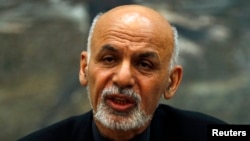There are broad hopes in Afghanistan that President Ashraf Ghani’s first official visit to the United States will ease the country's daunting security and financial challenges and strengthen bilateral ties.
President Ghani’s landmark visit to Washington starts March 22. It is happening just as Afghanistan's annual spring fighting season is about to begin.
For the first time in their decade-long war, Afghan security forces will be battling the Taliban and other insurgent groups without active foreign military support. That ended in December when most of the U.S.-led international force fighting alongside Afghan troops left the country.
The foreign forces' departure, the unprecedented level of casualties Afghan forces suffered during the past year and a lack of progress in President Ghani’s efforts - together with Pakistan - to open peace talks with the Taliban are behind widespread concerns about security in Afghanistan.
Kabul-based political analyst Haroun Mir says Ghani will tell U.S. leaders he needs firm commitments of American military help in the continuing fight against the Taliban.
“Last year [the] Taliban launched very extensive operations throughout the entire country, in almost 16 provinces, and the level of casualties of the Afghan security forces was very high, more than 5,000. And that is not sustainable. And we do not know what will happen this year: how the Taliban will behave and react vis-a-vis the peace process, and will the Afghan security forces be able to hold ground against the Taliban, and not allow the Taliban to gain territory.”
The U.N. Assistance Mission in Afghanistan (UNAMA), which has documented casualties in Afghanistan since 2009, reports last year was the deadliest ever for civilians.
UNAMA’s chief, Nicolas Haysom, briefed the Security Council in New York this week about 2014's toll of injuries and deaths. He warned that more fighting lies ahead, although he also praised the Afghan forces' improved planning and operational capacity.
“They are now in a position to conduct large-scale operations without direct combat assistance from international military forces," he said. "This development is encouraging, even though we expect to see an intensification of combat in the upcoming fighting season as insurgents seek to test [the Afghan National Security Force] capacity to hold ground on their own.”
Haysom also cautioned about the threat the Islamic State group poses to Afghanistan.
"Recent reports have indicated that the Islamic State of Iraq, or DAESH as it is called in the region, has established a foothold in Afghanistan," he said. "It is UNAMA’s assessment that the group’s presence is of concern, but that ISIL’s significance is not so much a function of its intrinsic capacities in the region, but of its potential to offer an alternative flagpole to which otherwise isolated insurgent splinter groups can rally.”
The United States has around 10,000 troops still stationed in Afghanistan. Current plans call for reducing the number to 5,500 by end of 2015. By 2017 a small residual American force will be confined to the U.S. Embassy in Kabul.
However, Afghan officials say President Ghani will ask American leaders to slow down the U.S. exit in light of the threat from the Islamic State.
At the U.S. State Department, spokeswoman Jen Psaki said this week the issue is under consideration and will be reviewed while Ghani is in Washington.
“President Ghani has requested some flexibility in the troop drawdown timeline and base closure sequencing over the next two years, and we are actively considering this request,” she said.
Ghani's political rival-turned-ally Abdullah Abdullah is Afghanistan's chief executive and is also accompanying the president on his visit to the United States. Afghan news media reported Abdullah said Friday that he hopes the talks in Washington will significantly change the country’s security and economic situation. He confirmed the Afghan leaders will emphasize their need for continued U.S. military and financial assistance.
The Taliban has long maintained it would not hold peace talks with Kabul until all foreign forces leave the country.
The group’s spokesman, Zabihullah Mujahid, told VOA this position is based on the insurgents' belief that the Unitged States has always intended to prolong its stay in Afghanistan.
However, the Taliban official says a reduced U.S. military presence in the country will be no more successful in providing security for Ghani's government than the full international force was. He vowed the Taliban would not discuss peace with the Kabul government but will instead intensify and continue its “jihad” until the last American soldier leaves the country.
President Ghani signed a security pact with the United States shortly after he took office, agreeing that a smaller contingent of American troops would remain in Afghanistan even after the NATO-led combat mission ended three months ago, in December.
Ghani's predecessor, Hamid Karzai, became highly critical of the United States during his last years as president. Despite repeated assurances, he refused to sign the security agreement before Mr. Ghani took power. That and other Karzai policies annoyed Washington and strained bilateral ties.
Kabul’s relations with Washington under President Ghani’s leadership have significantly improved. Officials of both governments say they are confident the Afghan president’s visit will further strengthen ties.




